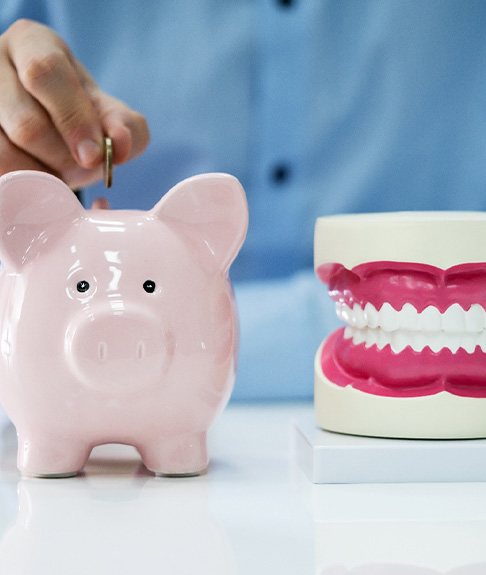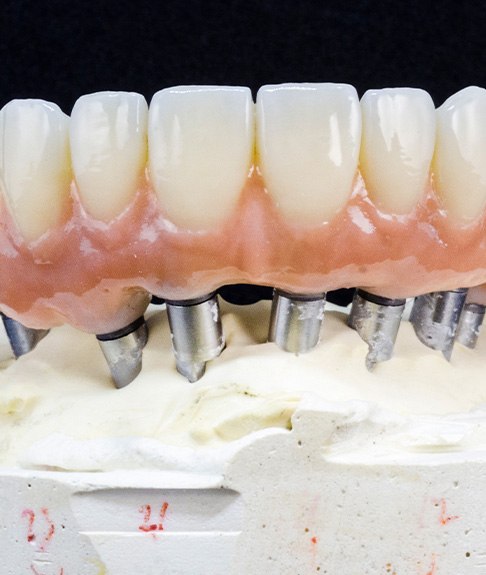Dentures – Lakewood, CO
Bringing Back Your Full, Functional Smile
While tooth loss is a trying condition, it’s more common than you think. As many as 178 million Americans today are missing at least one of their teeth. For that reason, dentists have long had a way to treat this matter and bring back a patient’s full grin: dentures in Lakewood! Here at Dr. Emanuel’s office, we'll use these prosthetics to reclaim your whole smile. Please read below to learn more about them or schedule your visit today.
Who’s a Good Candidate for Dentures

If you’re an adult with decent health, chances are good that you qualify for dentures. These tooth replacements don’t require much beyond that you're dealing with missing teeth. Still, not every patient who suffers from tooth loss is a good candidate. A person who hasn’t lost all teeth along an arch may do better with a different restoration. Similarly, a would-be candidate may lack the healthy gums needed to support dentures. During your consultation with Dr. Emanuel, she will confirm if dentures are right for you. If so, we’ll proceed with drafting a treatment plan just for you. Until your visit, here are some things to take into consideration.
Effects of Missing Teeth

Tooth enamel is the strongest material in the entire body. It’s even stronger than bone! However, it can still become damaged if you aren’t careful. Teeth can be lost due to tooth decay, gum disease, and trauma to the mouth. According to the American Academy of Periodontology, there are numerous negative side effects of tooth loss, including facial sagging, difficulty speaking, challenges when eating, and low self-confidence. By replacing your missing teeth with dentures, you can improve all of these areas, improving your overall quality of life.
What Qualifies You for Dentures?

Dentures are an excellent solution for people who are missing multiple, most of, or all of their teeth. Depending on the number of teeth you are missing and where they are located in the mouth, our team can put together a customized treatment plan to meet your needs. It is important that you have good oral health before you can get dentures, so any existing dental issues, like tooth decay or gum disease, need to be eliminated beforehand. Once your existing teeth and gums are in good shape, we can move on with the dentures process.
Alternative Tooth-Replacement Options

Do dentures not sound like the right choice for you? You may benefit from another tooth replacement option that we offer. Here’s how they work:
- Dental Bridge: A dental bridge works by “bridging” the gap in your smile with a replacement tooth. The replacement tooth, also known as a “pontic,” is supported by two dental crowns that are placed on the adjacent teeth. This is ideal for people who are only missing one or a few consecutive teeth.
- Dental Implants: A dental implant is a titanium, screw-like post that is surgically inserted into the jawbone to support a replacement tooth. This requires that the patient has a healthy, sufficient jawbone. Dental implants have a higher upfront cost, but they are intended to last for many decades or even the rest of your life.
Types of Dentures

Based on what we'll learn at your consultation, our practice may suggest one of three kinds of dentures. These types are the following:
Partial Dentures
Per its name, a partial denture is a type that only replaces a few teeth. This device normally fits over a patient’s gumline with suction or clasps onto abutments (i.e., nearby natural teeth). From there, it relies on its pink acrylic base and color-matched teeth to blend in with your smile.
Full Dentures
In contrast to partial dentures, a full one replaces an entire arch of teeth at once. It thus relies on suction force or adhesives to remain secure; it doesn’t alter other teeth by using clasps. To ensure a good fit, each full denture is also customized to sit snugly and comfortably over your gums.
Implant Dentures
If you’d like something a bit more permanent, implant dentures are the way to go. These kinds secure themselves with dental implants – posts that fuse with your jawbone. As a result, a good implant denture will remain very stable and secure for years at a time. Not only will it not slip or fall like other restorations can, but it’ll also prevent facial collapse.
The Benefits of Dentures

By getting dentures through Dr. Emanuel, you’ll enjoy perks like:
- Gorgeous Results – Modern dentures use excellent materials, so their artificial teeth look very lifelike and natural. You can trust them to fill your smile gaps seamlessly.
- More Confidence – Once dentures bring back your full smile, they’ll help you feel more confident. Wearing them will help you feel self-assured when you’re chatting with friends or family.
- Better Nutrition – Since dentures help you eat, they also expand your dietary options and improve your overall health.
- Long-Lasting Savings – Compared to other options like dental implants or bridges, dentures cost less even as they work well. They’re quite ideal for patients with limited budgets.
Understanding the Cost of Dentures

Dentures aren’t just prosthetic teeth, they’re an investment in your smile, confidence, and oral health. At Carole Emanuel, DDS, we strive to make these fantastic oral appliances as accessible and affordable as possible. While denture costs can vary based on materials, type, and other variables, you can rest assured that you’re getting the best quality for the lowest price. If you’re curious about the factors that affect the cost of dentures, continue reading below!
Factors that Affect the Cost of Dentures

All dentures are custom-made, making it impossible for any two to be exactly alike. Because of this, the cost can vary depending on several factors, such as:
- The Type of Dentures: Full, partial, or implant-supported options all have different price ranges, reflecting their unique construction.
- The Materials Used: Higher quality materials like porcelain teeth and an acrylic base often cost more up front. However, they ensure better durability, comfort, and aesthetics.
- Necessary Preparatory Work: If you need preparatory treatments like tooth extractions, it can add to the overall cost.
At our Lakewood office, we will always provide a clear estimate upfront and tailor your treatment plan to fit your budget and needs. There won’t ever be any surprise fees or undiscussed charges!
Are Implant Dentures More Expensive?

Yes, implant dentures typically cost more than traditional dentures, but they offer long-term value and many other benefits that traditional dentures can’t match. Implant dentures require surgical placement of titanium posts into your jawbone to create an anchor for your prosthetics.
This additional step increases the upfront cost but eliminates the need for adhesives, relines, and regular replacements. They also help preserve your jawbone and provide unparalleled comfort and functionality!
Does Dental Insurance Cover Dentures?

Yes! Many dental insurance plans will cover part of the cost of dentures. Coverage often includes a percentage of the cost for traditional dentures or preparatory procedures like extractions. However, it’s crucial to check the details of your plan or call your insurance provider to see what’s included in your specific plan.
At Carole Emanuel, DDS, we’ll help you navigate your insurance benefits and maximize your coverage. Just ask our friendly staff members and they’ll guide you through the process step-by-step. They’ll even file claims on your behalf so you can spend less time on the paperwork.
Other Options for Making Dentures Affordable

At our Lakewood office, we’re committed to making dentures accessible for every budget. This is why we proudly accept financing options like CareCredit, which allows you to spread out your payments over time. Our team will work with you to create a payment plan that fits your financial situation.
We want to help you achieve the smile you deserve without stressing over your finances. So, give us a call and take the first step toward the gorgeous grin of your dreams!
Denture FAQs
What is the Average Age for Dentures?
Did you know that according to the National Center for Health Statistics, about 66% of adults who are between 40 and 64 years old have lost at least one tooth, compared to only 33% of those who are 20 to 39 years old?
As you get older, your mouth produces less saliva, and your immune system doesn’t function as effectively. These conditions are ideal for bacteria to flourish and leave you more prone to gum disease, the leading cause of tooth loss. Not only that, but your enamel has naturally worn down after years of daily use, so you’re also more prone to losing teeth to tooth decay or injury.
That means that although tooth loss impacts people at all stages of life, it’s a much more common issue for older adults.
What Qualifies You for Dentures?
Potentially, anyone who has lost permanent teeth can benefit from dentures, but that doesn’t mean you’re automatically a good candidate for this type of restoration.
There are three kinds of dentures, and each has its own qualifications, as outlined briefly below:
- Partial dentures. These are ideal for those missing some, but not all, their natural teeth. They typically stay put by clasping to healthy teeth in your mouth via metal clips build into the base.
- Full dentures. Full dentures replace an entire arch and rely on a firm suction against the gums over your bony ridges to remain in place. You must have sufficient jawbone density and healthy connective tissues to support these teeth.
- Implant dentures. For a more permanent solution, 4 to 8 implants can be surgically placed in your jawbone to anchor a full set of dentures. If your jawbone isn’t strong enough to hold them, sometimes a bone graft procedure can bulk it up so you can proceed.
Will it Hurt to Get Dentures?
If you’ve most but not all your teeth, there’s a good chance that Dr. Emanuel will need to extract any remaining for your prosthetics to fit properly. You’ll be numbed and/or sedated during this procedure, so you don’t feel any pain, but it’s normal to have mild to moderate aches after the meds wear off. Usually, this can be safely addressed with Tylenol or ibuprofen, but if you were given a prescription pain pill, take it exactly as directed.
Otherwise, being fitted with your restoration isn’t considered painful. You might experience gum sensitivity or irritation when you start wearing them until the tender tissues in your mouth acclimate to their presence.
Can I Sleep with My Dentures?
Many patients grow frustrated with frequently removing and reinserting their dentures and wonder if it wouldn’t be easier and simpler to sleep with them in at night. While this might be okay now and then, it’s typically not recommended for a few different reasons, such as:
- Soft tissue irritation. Your gums need a break from the constant pressure of supporting your prosthetics all day or they could develop sores and blisters that makes wearing them uncomfortable.
- Gum disease. Your connective tissues are especially vulnerable to infection and disease with dentures because they can trap bacteria. If germs are pressed tightly against them 24/7, you’re more likely to develop periodontal problems.
- Dry mouth. Saliva is your body’s natural defense against unwanted germs, but its production slows at night. Germs tend to flourish and can cling to your dentures and form plaque that can cause gum disease and bad breath.
To keep your dentures happy and healthy, it’s better to leave them in a glass of water or a special soaking overnight to kill up to 99% of germs while you rest.

